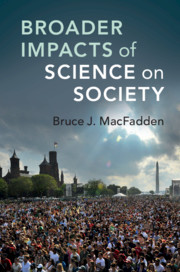Book contents
- Broader Impacts of Science on Society
- Reviews
- Broader Impacts of Science on Society
- Copyright page
- Contents
- Preface
- Abbreviations, Definitions, and Acronyms
- 1 Introduction: Science, STEM, and Society
- 2 NSF and Broader Impacts
- 3 Innovation, Opportunity, and Integration
- 4 Communication and Dissemination
- 5 Promoting Yourself and Optimizing Impact
- 6 Collaboration, Authorship, and Networks
- 7 Strategic versus Curiosity Science
- 8 Know Your Audience
- 9 Diversity, Equity, and Inclusion
- 10 Mentoring and Role Models
- 11 Formal K–12 Education and Partners
- 12 Higher Education
- 13 Informal STEM Learning in Museums and Beyond
- 14 Public Participation and Community (Citizen) Science
- 15 Computers and Cyberimpacts
- 16 Developing a Broader Impacts Plan
- 17 Project Management and Sustainability
- 18 Were You Successful? Evaluation and Metrics
- 19 Wrap-Up, the Future, and Broader Impacts 3.0
- References
- Index
17 - Project Management and Sustainability
Published online by Cambridge University Press: 11 October 2019
- Broader Impacts of Science on Society
- Reviews
- Broader Impacts of Science on Society
- Copyright page
- Contents
- Preface
- Abbreviations, Definitions, and Acronyms
- 1 Introduction: Science, STEM, and Society
- 2 NSF and Broader Impacts
- 3 Innovation, Opportunity, and Integration
- 4 Communication and Dissemination
- 5 Promoting Yourself and Optimizing Impact
- 6 Collaboration, Authorship, and Networks
- 7 Strategic versus Curiosity Science
- 8 Know Your Audience
- 9 Diversity, Equity, and Inclusion
- 10 Mentoring and Role Models
- 11 Formal K–12 Education and Partners
- 12 Higher Education
- 13 Informal STEM Learning in Museums and Beyond
- 14 Public Participation and Community (Citizen) Science
- 15 Computers and Cyberimpacts
- 16 Developing a Broader Impacts Plan
- 17 Project Management and Sustainability
- 18 Were You Successful? Evaluation and Metrics
- 19 Wrap-Up, the Future, and Broader Impacts 3.0
- References
- Index
Summary
The National Science Foundation (NSF) has developed a culture that by funding projects they are making investments in research and education. Implicit in this notion is that NSF is a partner in the project. Thus, there is an added expectation of resources provided by the host institutions receiving the funding, as well as other stakeholders. A corollary of NSF’s expectation is the notion of sustainability of projects – that is, that some components of the project will continue after NSF funding ends (Inset 17.1; Oxford Living Dictionaries, 2019). The noun “sustainability” and adjective “sustainable” have dramatically increased in frequency and public awareness over the past several decades (e.g., UNESCO, 2010). A decade ago the notion of sustainability, or sustainable projects, likewise became more commonplace at NSF, but initially within a different context, that of sustainable science.
- Type
- Chapter
- Information
- Broader Impacts of Science on Society , pp. 224 - 235Publisher: Cambridge University PressPrint publication year: 2019

